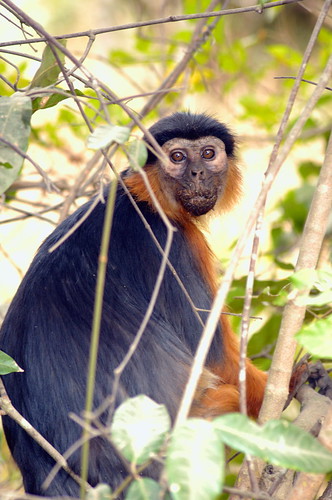
At one time the Angolan Black and White Colobus monkey’s range spanned the entire East African coastal stretch from Somalia to Mozambique, but today they can only be found on the southern coast of Kenya and the northern Tanzanian highlands. In some areas, populations have declined by as much as 50%. Their decline is mainly due to the fragmentation and loss of their forest habitat, but can also be attributed to road kills, electrocutions from power lines, poaching, pet trade, and conflicts with humans that result in lethal pest management practices.

The Colobus Trust (CT) was formed in 1997 in the Kenyan coastal area of Diani because of public outcry about the dramatic increase in deaths of Angolan Colobus monkeys in the area. The Trust works closely with local communities and businesses to promote conservation of the species and encourage protection of both the monkeys and their associated coastal forest habitat, a globally-recognized biodiversity hotspot. CT conducts research on the species to better understand its biology and interactions with its ecosystem. The results of their many research projects provide them with valuable information that can be applied to their conservation efforts in order to best achieve their goals.

They actively work to secure the last remaining patch of primary forest, which is critical to this primate’s (and others’) survival, with forest surveys, reforestation projects, and offering sustainable alternatives to the use of the forest resources. They promote eco-tourism by conducting tours for visitors to see the forest and its beauties, as many visitors come to Diani because of its ecological appeal. CT provides rescue action for monkeys that have become a problem of conflict with humans, and also rescues monkeys suffering injury from vehicle collisions, electrocution, poisoning, and dog bites.

Animals brought to CT receive medical attention at their veterinary clinic. After treatment, the monkeys are carefully rehabilitated so as to successfully return them to their natural habitat. CT also accepts pet monkeys and provides them with a way to interact with other monkeys and their habitat, so that they can eventually be released into the wild too. CT releases troops of monkeys together so that the monkeys can work together to be successful. To reduce road kills, CT constructs and installs “colobridges”, providing monkeys with a safe way to move across roads. The bridges have significantly reduced the number of road kills each year. The Trust conducts weekly education workshops for local primary and secondary schools to come learn about primates, the environment, and conservation. CT also conducts environmental workshops for local businesses and residents to learn about how they can lessen conflict with the monkeys and reduce their negative impacts on the ecosystem as a whole.

To reduce deaths and injuries caused when monkeys attempt to use un-insulated powerlines to navigate the forest, CT works with Kenya Power and Lighting Company (KPLC) to cut back and remove vegetation from the areas around powerlines on a weekly basis. The Trust also patrols forest patches every week and destroys every snare it finds. Students often accompany CT on these patrols so that they can see firsthand how this activity is affecting the Black and White Colobus population (as well as other wildlife species). The Colobus Trust is a valuable commodity to the conservation of the last remaining Black and White Colobus monkeys, and greatly contributes to the protection of the global biodiversity hotspot in Kenya’s southern coastal forest biosphere.

To learn more, please visit their website


Full congratulations to the trust and their positive work. Education is the key to lots of these issues & the involvement of the Power co. & road authorities.